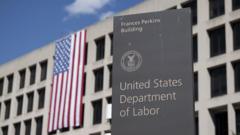Is Trump the Hitler of Our Time? Protesters Disrupt His Seafood Dinner

Published: 2025-09-10 12:53:47 | Category: News
As tensions in the US rise over the ongoing Israel-Gaza conflict, former President Donald Trump faced backlash during a public appearance following a protest by the group Code Pink. The protest highlighted the dire humanitarian situation in Gaza, where a famine was declared last month, affecting over half a million people. Despite this, Israeli officials deny the existence of famine, leading to a contentious debate about aid and responsibility.
Last updated: 27 October 2023 (BST)
Key Takeaways
- Tensions are escalating in the US regarding the Israel-Gaza conflict.
- A famine has been declared in Gaza for the first time in history.
- Protesters are targeting public figures, including Donald Trump, over their stance on the situation.
- Israeli officials are denying claims of famine, describing them as falsehoods.
- Public outcry is growing over the humanitarian crisis in Gaza.
The Protest at the Restaurant
Trump's dining experience was interrupted by a protest orchestrated by Code Pink, a group known for advocating for peace and social justice. Their demonstration was aimed at drawing attention to the humanitarian crisis in Gaza, particularly in light of the recent declaration of famine. The protesters' slogan, “They feast while Gaza starves,” resonated with many who are concerned about the plight of Palestinians.
Public Reaction and Statements
The protest included strong rhetoric, with Code Pink branding Trump as "the Hitler of our time" and calling for solidarity with Palestine. The group's statements reflect a growing sentiment among activists who believe that the US government should take a more active role in addressing the humanitarian issues arising from the conflict.
Understanding the Humanitarian Crisis in Gaza
The United Nations-backed Integrated Food Security Phase Classification (IPC) officially declared a famine in Gaza last month, marking a critical turning point in the region's ongoing crisis. This declaration comes as over half a million residents face catastrophic living conditions due to a lack of food and essential resources.
What is the IPC?
The Integrated Food Security Phase Classification (IPC) is a global initiative that aims to provide a systematic way to classify the severity of food insecurity. It helps organisations understand the underlying causes of food shortages, enabling them to respond effectively. The IPC has highlighted Gaza's dire situation, raising alarms about the urgent need for humanitarian assistance.
Israeli Denial of Famine Claims
Israeli authorities have vehemently denied the claims of famine, labelling them as "lies" and "modern blood libel." They argue that reports from the IPC are unreliable, suggesting that the data is influenced by sources affiliated with Hamas, the governing entity in Gaza. Israeli Prime Minister Benjamin Netanyahu has publicly dismissed the notion of famine, insisting that there is no policy of starvation and that the situation is not as dire as portrayed by critics.
Trump's Response to the Famine Claims
In June, during a discussion about the humanitarian crisis, Trump seemed to acknowledge the severity of the situation, citing troubling images of malnourished children. He remarked, “Based on television, I would say not particularly, cause those children look very hungry.” Despite his agreement that issues exist, he also pointed out that the US was providing substantial aid to the region.
The Growing Humanitarian Crisis
As the conflict enters its third year, the humanitarian crisis in Gaza continues to worsen. Reports have emerged of starving Palestinians, including infants, eliciting widespread public concern and calls for intervention. The images circulating in the media have sparked outrage and demand for immediate action from the international community.
International Aid and Responsibility
Israel controls the flow of all aid into Gaza, leading to questions about its responsibility in the humanitarian crisis. Despite international support, including financial aid from the United States and the UK, many believe that the assistance is insufficient given the scale of need. The debate over the adequacy and distribution of aid underscores the complexities of the situation.
The Political Landscape in the US
The US's unwavering support for Israel as its largest international ally complicates its position on the humanitarian crisis in Gaza. As public sentiment shifts, particularly among younger demographics, there is increasing pressure on political leaders to reassess the US's role and response to the conflict.
What Happens Next?
The ongoing tensions in the US regarding the Israel-Gaza conflict are likely to escalate further, particularly as protests continue and public awareness grows. Activist groups are expected to intensify their efforts to bring attention to the humanitarian situation, while political leaders may face increasing scrutiny over their positions and actions related to the crisis.
As we observe the unfolding events and their implications, it is crucial to stay informed about the humanitarian situation in Gaza and advocate for responsible actions that prioritise human rights and aid.
FAQs
What led to the famine declaration in Gaza?
The famine in Gaza was declared due to a combination of factors, including prolonged conflict, a blockade that limits access to essential supplies, and the impact of economic conditions that have left many residents unable to secure food.
How is the international community responding to the crisis?
The international community has expressed concern over the humanitarian situation in Gaza, with various organisations providing aid. However, there are significant challenges in ensuring that aid reaches those in need due to restrictions imposed by Israeli authorities.
What are the implications of the protests against Trump?
The protests against Trump are indicative of broader dissatisfaction with US policy towards Israel and Palestine. They reflect a growing movement advocating for humanitarian intervention and a reassessment of long-standing support for Israeli government actions.
Why do some people deny the existence of famine in Gaza?
Some officials, particularly in Israel, deny the existence of famine by arguing that reports are biased and not based on credible sources. This denial is often rooted in political narratives about the conflict and the role of Hamas in governing Gaza.
What can individuals do to help the situation in Gaza?
Individuals can help by educating themselves about the conflict, donating to reputable humanitarian organisations working in the region, and advocating for policies that promote peace and aid access for those in need.



